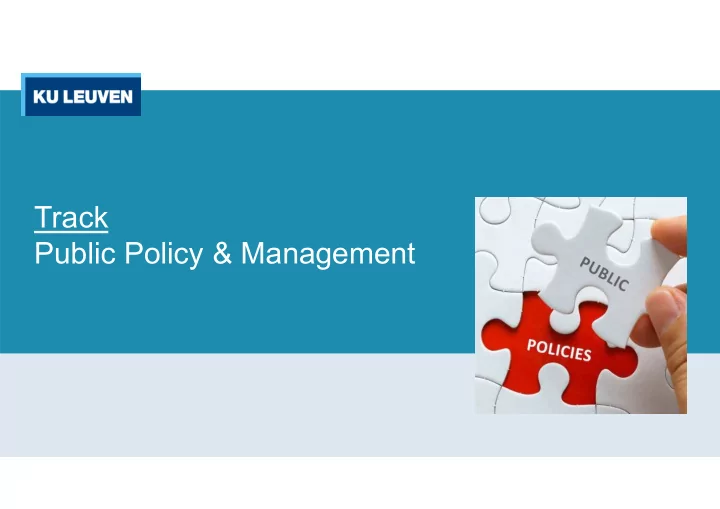

Track Public Policy & Management
Rationale Economists and managerial approaches of business put great weight on state action and the polity Doing business is to a large extent determined by government action Porter’s Diamond Model may serve as an illustration Source : Porter, Michael E. (1990). The competitive advantage of nations. Basingstoke : Macmillan. 2 Faculty of Economics & Business
Rationale Two elementary motivations 1. Understand policy effects on business: ‘doing business’ 2. Work for government / non-profit / lobbying: ‘doing policy (influence)’ Basic goal: hands-on knowledge and skills to understand, manage, and evaluate policy: Generic in areas of public policy, with stress on socio-economic issues Specific economic and economists’ perspective Tailor programme to your prospective career 3 Faculty of Economics & Business
Rationale 1. Doing business 2. Doing policy Starting point: underestimation of the role of Starting point: general dearth of economic / public sphere in business managerial background in public sector Learn to understand the economic and Also: influencing policy business relevance of government Learn about policy, evaluation of programs, and policy management 4 Faculty of Economics & Business
Future career opportunities Prepares students for positions that relate to public administration Corporate: sectors that strongly depend on policy (from real estate over healthcare to the military) Management in business demanding some insight in government functioning In public administration (EU, international, national, local) Applied research for public administrations (consulting) Lobbying Business or non-profit jobs interacting with / servicing public administrations Depending on your ambitions, we advise to fine-tune your profile with a strategic choice of electives (12 study points) Opportunity to study European institutions and decision-making 5 Faculty of Economics & Business
Courses: core Three courses (6 credits each) are compulsory I. Economics of the public sector II. Policy Evaluation III. Policy, Economy, and Society All make use of (partial) continuous assessment (paper, presentations, reviewing fellow students’ work, class discussions) Semester 1 courses: also written exam Professors: policy-oriented research profile, quite a bit of hands-on advisory policy experience
Courses: core SEMESTER 1 I. Economics of the Public Sector (prof. M. Maes & T. Van Puyenbroeck ) Economic framework for government interference in a market economy, as well as potential reasons for government failure Discussion of typical (EU/national) budget framework and components Measurement and evaluation of redistributive effects & welfare costs of taxes and subsidies, sustainability of public debt, fiscal federalism,… II. Policy Evaluation (prof. Nick Deschacht) Hands-on discussion of contemporary methods for policy debates Case-based Goal: application and critical evaluation of evidence-based policy methods
Courses: core SEMESTER 2 III. Policy, Economy, and Society (prof. Stef Adriaenssens & Dieter Verhaest) Learn about policy in action Applies knowledge and skills acquired in 1 st -semester courses Focuses on ‘what works’ (what works not), and on the management and design dimension of policy 5 diverse substantial policy themes discussed with Ex cathedra introduction (assessment: quiz) - Presentation of 1-2 crucial research papers by students (assessment: - presentation and discussion quality) Review by other student (assessment: quality of review) -
Courses: electives Depending on your orientation, you choose two more courses (2*6 credits). Some suggestions (5): I. Standard ‘European’ orientation European Institutions and Decision Making (sem. 1) General outline of the architecture of European institutions Alternative, oriented to more than the EU: → International and European relations (sem. 1) European Affairs Management (sem. 2) Hands-on discussion about organizing influence in EU institutions II. Environmental policy Sustainable Management (sem. 1) Sustainable Economics (sem. 2) Both courses from the track in the MA Sustainability Management
Courses: electives III. Orientation public finance & accounting Advanced Financial Statement Analysis (sem. 1) Management Control and Cost Management (sem. 2) Both courses from the track in the MA Accounting IV. Data analysis option Predictive Business Analytics (sem. 1, elective) Data Management and Business Intelligence (sem. 1, BIM) … or econometrics / methodology course in Leuven campus V. ‘Free as a bird’-option Choose any 12 credits in FEB-courses at MA level
Master Thesis We advise students to apply and sharpen their acquired skills and knowledge in their thesis This is not compulsory, though Preferred format: article We will provide a sufficient number of thesis topics related to policy and policy management, e.g. Studying the effect of a certain policy measure Ex-ante empirical research (e.g. discrete choice experiment) Literature review (systematic review, meta-analysis) of a specific field or set of measures
Master Thesis Examples of master thesis topics: Differences in overeducation across countries: the role of public and private investments in higher education ‘Squeeze ‘em till they squeak’? A natural experiment in tax compliance, enforcement, and government legitimacy The European Social Progress Index: Sensitivity Analysis and Conditional Benchmarking Can policy influence attitudes and norms? The case of affirmative action in employment The labour market effects of the Belgian tax regime for company cars: an evaluation Labour market participation of mothers and fathers: an instrumental variable study The economic effects of crime: solving the crime-poverty conundrum
Contact More information required? stef.adriaenssens@kuleuven.be
Recommend
More recommend